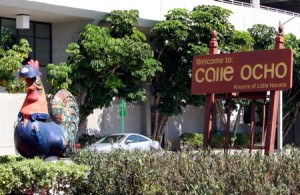Opening up Cuba: Is it time to end the embargo?

By Marianela Toledo | Florida Watchdog
MIAMI — Elena Freyre reminisces about the time before the recession when she owned a gallery in “Little Havana,” a downtown neighborhood that occupies several blocks — the center of social, cultural, and political activity in Miami.
Now she’s content to sell her art on the Internet and wait for the day when she can run a business in Havana. Not the neighborhood — the capital of Cuba.
LITTLE HAVANA: Some business owners In the 8th street in Miami, are looking forward to run their business in the Havana, Cuba.
“I can’t open a gallery in Havana at this time, but things are changing,” said the Cuban-American businesswoman.
Freyre, who also is president of Foundation for Normalization of US-Cuba Relations, said she has seen “substantial changes” over the last year and a half and relations are “going smoothly” between the two countries.
“We’ve been patient for the past 50 years,” she said. “We just have to have a little more patience.”
She’s one of the many who’ve expressed renewed interest in ending the U.S. government’s more than 50-year-old embargo that was signed into law after years of strained diplomatic relations and Cuba’s refusal to move toward democratization and exhibit a greater respect for human rights.
Last January, The Atlantic Council, a think tank promoting engagement in international affairs, commissioned a poll in both Spanish and English on the American public’s views toward relations with Cuba and found 56 percent of respondents were in favor of a policy shift.
The survey was conducted from Jan. 7 -22, with a margin of error of plus or minus 3.1 percent.
Armando Pedro Freyre, assistant law instructor at Columbia University in New York and an analyst on issues related to Cuba, said the survey shows “it’s time to set up a meeting, a commitment to normalizing relations with Cuba.”
“Lifting the embargo,” he said, “is extremely complicated from a legal point of view.”
One reason: There still are crucial differences between Cuba and the United States on human rights issues that need to be addressed before the embargo could be lifted.
“The Cuban government doesn’t appear to have made any progress there,” Freyre said.
Other supporters of a policy shift include organizations like the Cuban Americans For Engagement, Generation Change Cuba Cubano and Educational Travel, all of whom will meet this month to discuss a normalization of relationships between the two countries.
One CAFE board member, Benjamin Willis, told Florida Watchdog.org that “our policy with Cuba is a failure.” He said Cuban immigrant and sugar magnate Alfonso Fanjul, a leading opponent of Raul Castro, has begun to talk about bringing his sugar business back home.
“These people have spent millions of dollars to keep the embargo going, but now see that it is an approach that doesn’t work,” Willis said.
The embargo is an economic, commercial and financial blockade imposed on Cuba by the United States, limited to U.S. companies doing business with interests on the island. At first, it was imposed on exports to Cuba (except food and medicine), but later was expanded to include almost all imports.
In 2012, encouraged by the lifting of some restrictions, the United States became the main supplier to Cuba of food and agricultural products and was a major supplier of drugs and medical products.
According to the U.S. Census data, the export of U.S. products to Cuba was $358 million in 2013 and $464 million in 2012, making the United States the seventh largest trading partner with Cuba.
The $1.8 billion of U.S.- owned property expropriated by the Cuban government in the 1950s in response to the embargo is a drop in the bucket compared to what is being lost each year. A letter co-authored by the U.S. Chamber of Commerce and other business organizations and sent to President Obama, claims the annual cost of the embargo to the U.S. economy is at least $ 1.2 billion.
The publication Dollars and Sense says the U.S. government spends another $27 million a year funding pro-democracy radio and television transmissions to Cuba, even though the signal is effectively blocked by the Cuban government.
A number of prominent members of Congress aren’t quite ready to bury the hatchet.
U.S. Sen. Marco Rubio, R-Fla., defended sanctions against Cuba. Rubio, whose family fled Cuba in the 1950s, said the Venezuelan government is a “puppet of Havana” and the motivation for the warming relationship between the two countries is that “the Venezuelan government is giving them cheap oil.”
When asked what, if any, restitution would be made to compensate Americans who lost property during the expropriation, Willis didn’t have an answer.
“That’s very complicated. There’s no answer for that. But that’s something that’s never going to solve the embargo.”
Harboring that grudge, he said, in effect “prolongs the problem.”
Freyre ,the law professor, acknowledges the seriousness of Cuba’s human rights violations, but said the United States maintains diplomatic and trade relations with many nations that do reprehensible things, including Russia, Saudi Arabia, Thailand and China. All of them, to varying degrees, violate human rights.
Freyre reasons that having diplomatic presence in these countries “supports and helps those who are being oppressed by the government.”
Meanwhile, the Cuba embargo issue is being used in the campaigns for the Florida governor’s race this November. Gov. Rick Scott, who is seeking re-election, is said to be against any measure that promotes lifting the embargo. Charlie Crist, the former Republican governor of Florida who is now running for the same office as a Democrat, wants to put an end to it.
The post Opening up Cuba: Is it time to end the embargo? appeared first on Watchdog.org.







